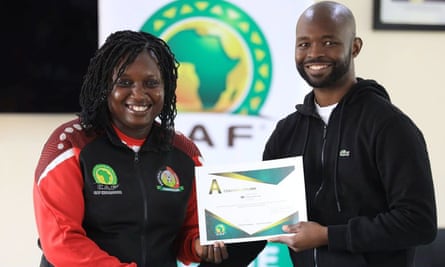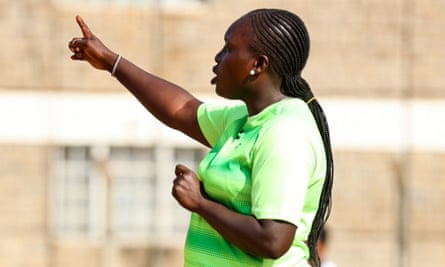“I can say so far so good,” Jackline Juma says, two and a half months after becoming the first female coach of a men’s team in the Kenyan Premier League. Results have been mixed after five points from five games but there are signs of progress that FC Talanta are on course to achieve her first target: avoiding a repeat of last season’s relegation battle, when the Nairobi club survived by a point. Really though, the 38-year-old wants a top-six finish in the 18-team league.
There is, of course, a bigger picture. Being a female coach of a top-tier professional men’s team could be a gamechanger if it goes well, but what if it doesn’t? “I don’t feel the pressure of being a representative female coach,” Juma says. “The chances of failing are possible; all coaches know that. Sometimes you win and sometimes you lose but when you do [lose] it must be a learning process. I do not feel pressure as I know I am capable.”
That self-belief has served her well. She fell in love with football at an early age, playing with her brothers and representing her country as a teenager. Her talent helped change the minds of parents who wanted a career in the law for their daughter. Yet even as an international she was thinking like a coach and going along that path became an early ambition.
Juma achieved it by coaching Kenya’s national women’s teams and various clubs. Usually, that is as far as it can go for a female coach but taking the Confederation of African Football’s A Licence this year, as one of two women on the 25-person course, was a gamechanger. Shortly after receiving the certificate – and getting the second-highest marks in her cohort – came a phone call from the chief executive of Talanta saying that now she had the highest qualification, how about taking over the men’s team.
Jackline Juma receives her A Licence certificate from the Kenyan FA’s chief executive, Barry Otieno, in May. Photograph: FKFIn August she did and, in the first game of the season in September, Juma was celebrating victory over Sofapaka. Whether it was shock, anger at an incident or something else, her experienced opposite number did not shake hands at the end. “Some people on social media said that it was because he had lost to a woman,” she says. There was a more positive interaction after the second match, a 1-1 draw at Bidco United, with their coach, Anthony Akhulia. “He was a classmate in the A Licence course and he told me that he could see that there was a lot of improvement since last season when we lost both games against them. His encouragement touched me and it was a really motivating chat.”
There is still some way to go, however. Talanta are not scoring enough goals. “We are creating a lot of chances but not taking them – we need to work more on our finishing,” Juma says. “You can do these things as a coach. What you can teach most is how to create chances; finishing depends on individual ability and the quality of strikers that you have.”
Years of experience mean she has much to teach and the players seem receptive to learning from a woman. “It took some of them a little time but they are starting to adapt to having a female coach, which is a very good thing,” she says. “I don’t think it will take much time. I can see the big progress that has been made already and we still need to push harder. Even if the players think: ‘This is a female coach,’ the respect they show me is very good and it means I can lead them, I can coach them. They are still taking it in but they are now thinking: ‘This is a coach that can help us.’” Fans have been supportive too. “They have been telling me that I can go and coach the men’s national team.”
Jackline Juma believes she has gained the respect of her players and some opposition coaches. Photograph: Talanta FCJuma is not yet 40 and her ambitions extend beyond keeping Talanta in the top tier. Whether her future lies with a bigger club in Kenya, the national team, somewhere else in Africa or farther afield, she wants to make a difference.
skip past newsletter promotionSign up to Football Daily
Kick off your evenings with the Guardian's take on the world of football
after newsletter promotion
“I have received a lot of comments and messages from all round Africa – it is an inspiration to tell my story. I want to inspire a lot of girls. I want to meet them, talk to them and tell them it is very much possible. Men coach women’s teams, so why can’t women coach men’s? There is no reason at all. It should not be about gender but credentials, knowledge and hard work.”
She mentors a group of young female coaches and wants – and expects – to see more following in her footsteps. Perhaps her own children.
“My son and daughter are footballers. My girl is especially proud of me and both keep on praying for me and I keep telling them there will be challenges but challenges are a good thing, you have to keep going so people can see that you are capable, that you can do anything.”
∎

